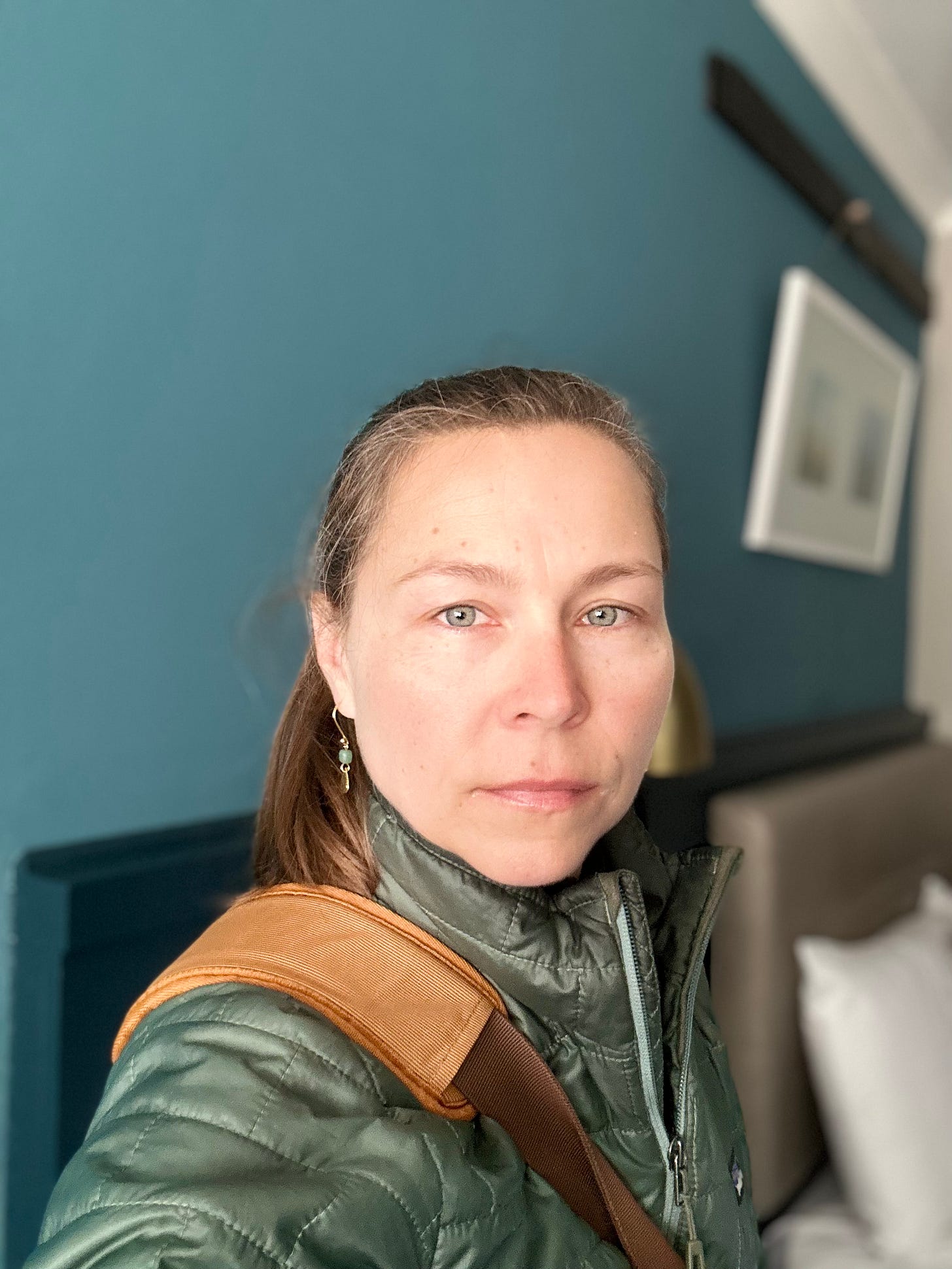It’s okay not to feel grateful on demand this week
The life-changing magic of radical contentment and radical self-care
Sometimes, gratitude seems to have been relegated to something much like hope has. That is, a word used to conjure feelings on demand like an arthritic circus pony that has been forced to do tricks against its better judgment so many times it’s forgotten all about the wide open green pastures of its youth, only to be tossed aside once the season has passed.
But what if it could be different? What if the expectation of on-demand feelings were liberated from a date on the calendar, and, preferably, obliterated altogether? One way to recover gratitude from the maws of consumer culture is to recognize it as an action, rather than a feeling. Hope is a job, and takes work. The same, then, is likely to be true for gratitude. But what if the work is…nice?
In her book, Braiding Sweetgrass, Robin Wall Kimmerer writes:
In a consumer society, contentment is a radical proposition. Recognizing abundance rather than scarcity undermines an economy that thrives by creating unmet desires. Gratitude creates an ethic of fullness, but the economy needs emptiness....gratitude doesn’t send you out shopping for satisfaction. It comes as a gift rather than a commodity, subverting the foundation of the whole economy. That’s good medicine for land and people alike.
Those feelings of You’re not grateful enough? That is part of the economy of emptiness too. And practicing radical contentment? It helps not only you, but the planet. But you knew this already, right? The story of stuff? If not, please take the 20 minutes to watch the film. You will never look at buying anything the same way again.
Gratitude as action
One of my dogs is 12. Sometimes I’m saddened when I think about the fact that she’s not going to be with us forever. In these moments, if she’s not next to me, I seek her out, and usually find her sleeping deeply and peacefully, curled up in a little ball we call a “cinnamon bun”, with her nose tucked just under her tail. In these moments, she is the embodiment of Enso, the Japanese character that represents many things: enlightenment, the absolute, the universe, the Void.
I have two options at this point: I can shame myself for not appreciating her enough: She’s not dead yet. You should feel more grateful and enjoy her companionship while you still have it. But this doesn’t conjure instant feelings of gratitude; it only conjures feelings of shame and guilt for not being grateful enough.
Or, I can practice loving her now because she is very much still alive, and take time out of my day to be absolutely present with her. It’s so easy sometimes to get lost in thought about what the future might hold, and then we miss…everything.
Thich Nhat Hanh offers some guidance for our conundrum with his poem, Our True Heritage:
The cosmos is filled with precious gems.
I want to offer a handful of them to you this morning.
Each moment you are alive is a gem,
shining through and containing earth and sky,
water and clouds.
It needs you to breathe gently
for the miracles to be displayed.
Suddenly you hear the birds singing,
the pines chanting,
see the flowers blooming,
the blue sky,
the white clouds,
the smile and the marvelous look
of your beloved.
You, the richest person on Earth,
who have been going around begging for a living,
stop being the destitute child.
Come back and claim your heritage.
We should enjoy our happiness
and offer it to everyone.
Cherish this very moment.
Let go of the stream of distress
and embrace life fully in your arms.
Rather than, You should be ashamed for not being more grateful, he seems to be saying, simply, Look!
Guilt is not a virtue. Feeling guilty for having more than others serves nothing. Embracing what one has, serves much. This is the benefit of gratitude practice, and the difference between forced gratitude professions and authentic appreciation.
The poem recommends we enjoy our happiness and offer it to everyone. Enjoyment of what we have is a prerequisite to being able to share it with anyone else.
A very serious generosity infection
During my recent trip to Scotland, I was hosted by a couple whose generosity—both of their time and their resources—affected me profoundly. At the time, I was learning and writing about the outpouring of kindness of the townspeople following the 1988 Lockerbie bombing.
Of course I felt gratitude to my hosts; and yet, my countless professions of thank you so much just never seemed to cut it. So I found ways to express my gratitude, with action. It was then received tenderly and gratefully. And it felt good: so much better than a thank you, because I had left something better than I had found it.
It didn’t end when I left. After taking the ferry from the Isle of Mull back to the mainland, I stopped in to the little convenience store next to the train station for some gum. A worker greeted me at the door:
“We are cash only right now.”
The credit card machines were down. Fortunately, I had some British pounds in my wallet and used them to pay for my gum. Just as I was handed a fistful of small bills and change by the checker, a hurried woman rushed up to the counter with her items.
“I’m sorry, we can’t use cards today. Cash only.”
“Oh no, oh no,” the woman said, nearly out of breath, and started to rush out the door.
“Ma’am!” I called out. I jutted my hand toward her, fingers outstretched the way you’re supposed to when feeding a horse an apple so they don’t bite you, a rumple of bills and change in a pile as the Queen gazed up from my palm. In that moment of little talk and much shove, I realized I had unconsciously started speaking minimally in public spaces because I became instantly less popular once people recognized my American accent.
“No,” she said, shaking her head, refusing an initial offer in the polite way British women seem to do.
“Please,” I insisted. Here comes the weird part: I literally felt desperate for this woman to take my money, as if the generosity I had just received on Mull was going to burst out of me if someone didn’t accept it, and soon.
“Thank you,” she relented, shyly, taking what she needed from my palm, and returning the change swiftly.
Sweet relief. Briefly. The generosity spasms didn’t stop there.
When I returned home, some requests for my time came in. Nothing extravagant, but things I would normally weigh the pros and cons of before committing. Only recently have I learned the power of a well-placed “No,” and I had been increasing my practice of this two-letter gem with great results.
Not this time. The generosity continued to spill out, as if I had some kind of surplus that needed to be spent. I gave of my time, money, expertise, knowledge, and more. There was no end to the feelings of abundance.
Here’s the kicker: the generosity of my friends on Mull was transformational. But the process didn’t start with them. It started with me.
I had no idea why I went to Scotland. Following the urge to do it, just because it felt like the right thing to do, was one of the most radical acts of self-care I’ve ever undertaken. The ability to receive the generosity of my friends stemmed from this. I would not have received their generosity if I had not, first, extended so much generosity to myself that it pushed my limits. It was as if what I received was proportional to the risk I took, and gave, to myself.
Self-care is a form of gratitude practice: it is an appreciation of the self. It counts.
In solidarity
I’ll leave you with two of my favorite, spiritual-adjacent, Thanksgiving-seasonal quotes, first from Anne Lamott:
Earth is Forgiveness School. You might as well start at the dinner table. That way, you can do this work in comfortable pants.
And from Ram Dass:
If you think you’ve become enlightened, go spend a week with your family.
With family, friends, or solo, whether secular or sacred, I hope your holiday is whatever you need it to be, however the day finds you: brimming with gratitude and generosity, or taking a mental health day from all of it.
Whatever you do, I hope you take care of yourself, first, so that generosity, hope, and gratitude can wander into your worldview as easily as a pony in a wide open meadow. Hope and gratitude are work, but that work does not have to be drudgery. Sometimes it can be pure joy.








